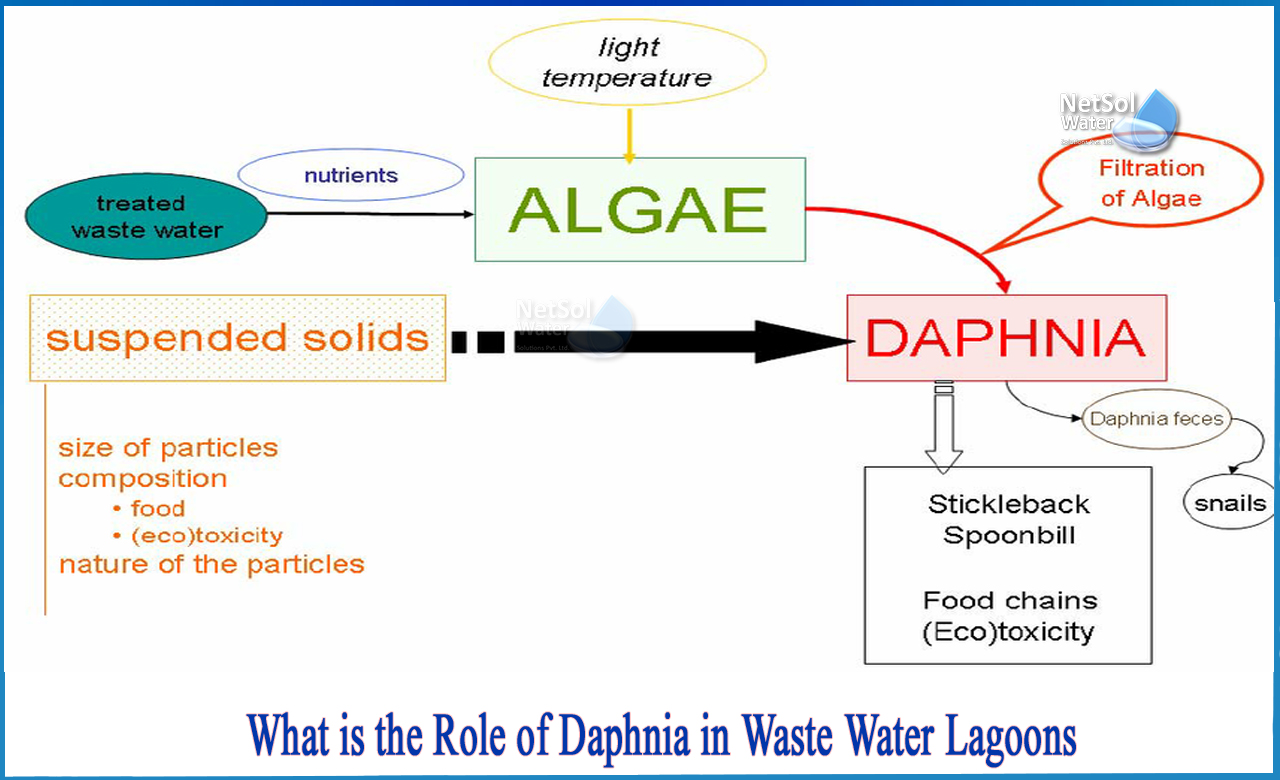What is the role of Daphnia in waste water lagoons?
Daphnia pulex, sometimes known as a water flea, is a freshwater crustacean related to shrimp. It gets its name from the way it moves through the water, which mimics a flea's hop. Daphnia, the most common microscopic crustacean, can be seen with the naked eye and has lengths ranging from 0.2 to 5 mm. Their reproduction alternates between asexual and sexual reproduction, with females producing eggs during the warmer season and males generating only when stressful situations are there such as overpopulation or freezing temperatures. Eggs deposited in the winter have a thicker protective shell and hatch in the spring.
Daphnia, like nematodes, bristle worms, and tartrigards, are metazoan creatures. Metazoa consume algae and bacteria, as do protozoa that consume algae and bacteria, such as amoeba, flagellates, and ciliates. In a wastewater treatment facility, bacteria do the heavy work by digesting soluble organic material such as protein, carbs, and lipids, then producing floc and settling away. Protozoa regulate the bacterial and disease populations, cycle nutrients, and increase water clarity. Metazoa regulate protozoa and bacterial populations, and some process sludge.
Daphnia's role in waste water lagoons:
A study of the wastewater food chain is required to offer context for Daphnia's function in lagoon treatment. Bacteria are at the core of waste digestion, breaking down organic material into smaller particles that may be settled. Protozoa consume these bacterium populations, lowering the organic burden. Metazoan creatures such as Daphnia keep protozoa, bacteria, and algae under control.
Under healthy lagoon conditions, Daphnia can be beneficial to wastewater operators. During the summer, these water fleas regulate green algae populations. As long as cyanobacteria aren't competing with those algal populations, total suspended solids (TSS), cloudiness, and turbidity will decrease, improving overall pond health. Dissolved oxygen levels are decreased as Daphnia populations increase.
Daphnia produces haemoglobin to boost oxygen efficiency when the DO is low. This haemoglobin causes water fleas to become reddish-pink, resulting in crimson streaks in your lagoon. When operators notice red water fleas, they should consider aerating or mixing the lagoon.
Many algal particles, such as those seen in blue-green or filamentous algae, are too big for them to swallow. They eat unicellular algae, bacteria, and protozoa, as well as a little sludge in the winter. Because blue-green algae and green algae compete, predation of green algae by Daphnia can aid in the establishment of toxic blue-green algae in the lagoon.As algae bloom in the spring, rising temperatures kickstart Daphnia's metabolism. Daphnia quickly proliferate in response to the availability of algae, assisting in the removal of TSS, cloudiness, and turbidity.
Lagoon Daphnia are beneficial as algae consumers, enhancing water clarity and lowering TSS, as well as regulating bacterial and protozoan populations. Daphnia's red or pink streaks in the lagoon indicate that the DO in the lagoon is low. Daphnia prefer lower pH environments, presumably because to the influence of ammonia on pH. They are ammonia-sensitive, preferring concentrations less than 0.15 mg/L and vanishing completely at concentrations more than 0.7 mg/L.
Daphnia, commonly known as water fleas and Ceriodaphnia, are metazoan crustaceans that can be managed by a restricted food source or the deliberate addition of hyacinths. During the winter, these one-eyed crustaceans may eat yeast, algae, bacteria, protozoa, and even sludge. Daphnia are a food source for tiny fish, tadpoles, and aquatic insects in the wild. Cold temperatures, overpopulation, low dissolved oxygen (DO), high ammonia levels, and high pH are all general stresses for water fleas.
For more information, contact Netsol Water.
Netsol Water is Greater Noida-based leading water & wastewater treatment plant manufacturer. We are industry's most demanding company based on client review and work quality. We are known as best commercial RO plant manufacturers, industrial RO plant manufacturer, sewage treatment plant manufacturer, Water Softener Plant Manufacturers and effluent treatment plant manufacturers. Apart from this 24x7 customer support is our USP. Call on +91-9650608473, or write us at enquiry@netsolwater.com for any support, inquiry or product-purchase related query.



